八年级下册英语重要知识点归纳
八年级下册英语所有知识点大汇总

nit1 what' s the matter?1. It’s +形容词 + for sb. + to do sth. 做某事对某人来说是…的。
It’s important to do sth. 做某事很重要。
It’s important for me to eat a balanced diet.平衡饮食对我来说是很重要的.It’s easy to do sth. 做某事是容易的。
It’s easy for us to find out the answer.找出答案对我们来说是容易的。
2. 情态动词should的用法should是情态动词,它的基本用法是必须和其他动词一起构成谓语。
意为"应该......"。
should(应当,应该)用于所有人称,表示劝告或建议。
eg. ---I have a very bad cold. 我感冒很厉害。
---You should lie down and have a rest. 你应该躺下,多喝水。
3. maybe与may be(1)maybe是副词,译为“也许、可能”,相当于“perhaps”。
如:Maybe he can answer the question. 也许他能回答那个问题。
He maybe is from the USA, too. 他可能也来自美国。
(2)may be中的may为情态动词,译为“可能是......”。
如:He may be from the USA, too. 他可能也来自美国。
She may be our English teacher. 她可能是我们的英语老师。
4. few、a few、little、a little的区别和联系:(1)few / a few用来修饰可数名词,few表示否定意义,没有,几乎没有;a few 表示肯定意义,有几个。
例如:He has few friends here, he feels lonely. 他这里没朋友,他感觉寂寞。
八年级下册英语语法知识点归纳总结
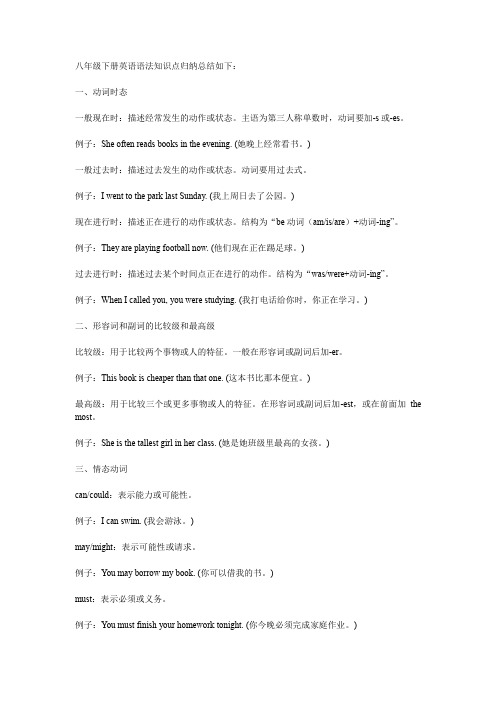
八年级下册英语语法知识点归纳总结如下:一、动词时态一般现在时:描述经常发生的动作或状态。
主语为第三人称单数时,动词要加-s或-es。
例子:She often reads books in the evening. (她晚上经常看书。
)一般过去时:描述过去发生的动作或状态。
动词要用过去式。
例子:I went to the park last Sunday. (我上周日去了公园。
)现在进行时:描述正在进行的动作或状态。
结构为“be动词(am/is/are)+动词-ing”。
例子:They are playing football now. (他们现在正在踢足球。
)过去进行时:描述过去某个时间点正在进行的动作。
结构为“was/were+动词-ing”。
例子:When I called you, you were studying. (我打电话给你时,你正在学习。
)二、形容词和副词的比较级和最高级比较级:用于比较两个事物或人的特征。
一般在形容词或副词后加-er。
例子:This book is cheaper than that one. (这本书比那本便宜。
)最高级:用于比较三个或更多事物或人的特征。
在形容词或副词后加-est,或在前面加the most。
例子:She is the tallest girl in her class. (她是她班级里最高的女孩。
)三、情态动词can/could:表示能力或可能性。
例子:I can swim. (我会游泳。
)may/might:表示可能性或请求。
例子:You may borrow my book. (你可以借我的书。
)must:表示必须或义务。
例子:You must finish your homework tonight. (你今晚必须完成家庭作业。
)四、被动语态被动语态用于描述事物的状态或描述被动发生的动作。
结构为“be动词(am/is/are/was/were)+动词的过去分词”。
八年级下册英语知识点总结归纳

八年级下册英语知识点总结归纳八班级下册英语学问点【1】【重点短语】1. fewer people 更少的人(fewer修饰名词复数,表示否认)2. less free time 更少的空闲时间(less修饰不行数名词,表示否认)3. in ten years 10年后(in的时间短语用于将来时,提问用How soon)4. fall in love with… 爱上…例:When I met Mr. Xu for the first time, I fell in love with him at once当我第一次见到许老师,我立即爱上他5. live alone 单独居住6. feel lonely 感到孤独(比较:live alone/go along等)The girl walked alone along the street, but she didn’t feel lonely那女孩单独沿着街道走,但她并不感到孤独7. keep/feed a pet pig 养一头宠物猪8. fly to the moon 飞上月球9. hundreds of +复数数百/几百(概数,类似还有thousands of; millions of)10. the same as 和……相同11. A be different from B A与B不同(=There is adifference/Thgere are differences between A and B)12. wake up 醒来(wake sb. up表示“唤醒某人”13. get bored 变得厌倦(get/become是连系动词,后跟形容词如tired/angry/excited等)14. go skating 去滑冰(类似还有go hiking/fishing /skating/bike riding等)15. lots of/a lot of 很多(修饰可数名词、不行数名词都可以)16. at the weekends 在周末17. study at home on computers 在家通过电脑学习18. agree with sb. 同意某人(的看法)19. I don’t agree. = I disagree. 我不同意20. on a piece of paper 在一张纸上(留意paper/information/news/work/homework/housework等常考到的不行数名词)21. on vacation 度假22. help sb with sth/help sb do sth 关心某人做某事23. many different kinds of goldfish 很多不同种金鱼24. live in an apartment 住在公寓里/live on the twelfth floor 住在12楼25. live at NO.332,Shanghai Street 住在上海路332号26. as a reporter 作为一名记者27. look smart 显得精神/看起来聪慧28. Are you kidding? 你在骗我吗2022八班级下册英语学问点29. in the future 在将来/在将来30. no more=not …anymore 不再(强调多次发生的动作不再发生)I’ll go there no more.31. no longer=not… any lo nger 不再(强调状态不再发生)32. besides(除…之外还,包括)与except …but(除…之外,不包括)33. be able to与can 能、会34.be big and crowded 大而且拥挤34. be in college 在上高校35. live on a space station 住在空间站36. dress casually 穿得很随便casual clothing 休闲服饰37. win the next World Cup 赢得世界杯 win award 获僵38. come true 变成现实39. take hundreds of years 花几百年的时间40. be fun to watch 看起来好玩41. over and over again 一次又一次42. be in different shapes 样子不同43. twenty years from now 今后20年八班级下册英语学问点【2】【重点语法】一般将来时表示将要发生的动作或存在的状态。
八年级英语下册知识点汇总
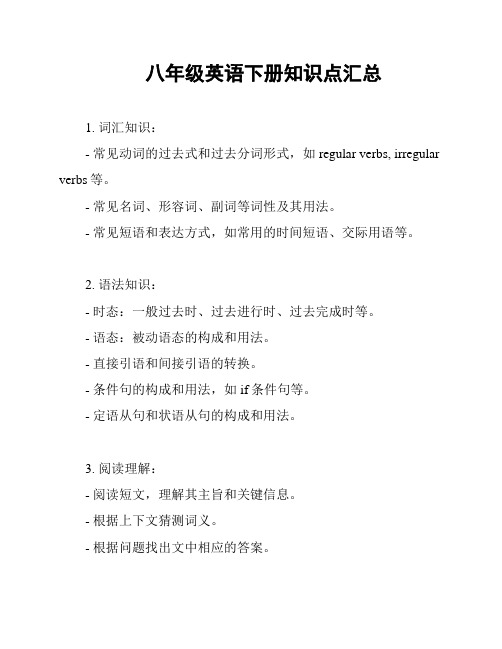
八年级英语下册知识点汇总
1. 词汇知识:
- 常见动词的过去式和过去分词形式,如regular verbs, irregular verbs等。
- 常见名词、形容词、副词等词性及其用法。
- 常见短语和表达方式,如常用的时间短语、交际用语等。
2. 语法知识:
- 时态:一般过去时、过去进行时、过去完成时等。
- 语态:被动语态的构成和用法。
- 直接引语和间接引语的转换。
- 条件句的构成和用法,如if条件句等。
- 定语从句和状语从句的构成和用法。
3. 阅读理解:
- 阅读短文,理解其主旨和关键信息。
- 根据上下文猜测词义。
- 根据问题找出文中相应的答案。
4. 写作技巧:
- 书面表达:写信、写作文等。
- 口头表达:进行简短的演讲、对话等。
- 语法和拼写的正确应用。
5. 听力技巧:
- 听取关键信息,如对话中的时间、地点、人物等。
- 根据对话内容回答问题。
- 培养对不同语速和语调的听力理解能力。
以上是八年级英语下册的主要知识点汇总,希望对你的学习有所帮助!。
八年级下册英语笔记重点归纳

八年级下册英语笔记重点归纳一、语法重点1、一般将来时构成:“will +动词原形”或者“be going to +动词原形”用法:表示将来要发生的动作或存在的状态。
例如:I will visit my grandparents next week (我下周要去看望我的祖父母。
)She is going to have a party tomorrow (她明天打算举办一个聚会。
)2、过去进行时构成:“was/were +现在分词”用法:表示过去某个时刻或时间段正在进行的动作。
例如:What were you doing at eight last night? (昨晚八点你在做什么?)They were playing football when it started to rain (开始下雨的时候他们正在踢足球。
)3、现在完成时构成:“have/has +过去分词”用法:表示过去发生的动作对现在造成的影响或结果,或者从过去开始一直持续到现在的动作或状态。
例如:I have already finished my homework (我已经完成了我的作业。
)She has lived here for ten years (她在这里住了十年了。
)4、宾语从句引导词:that(在口语或非正式文体中常省略)、if/whether(是否)、特殊疑问词(what, when, where, why, how 等)语序:宾语从句要用陈述句语序。
时态:主句是一般现在时,从句根据实际情况使用各种时态;主句是一般过去时,从句要用相应的过去时态。
例如:He says that he is a student (他说他是一名学生。
)I don't know if he will come tomorrow (我不知道他明天是否会来。
)5、情态动词should :表示“应该”,用于提出建议或表达义务。
could :表示“能,可以”,语气比 can 更委婉。
英语八年级下册unit3知识点

英语八年级下册unit3知识点英语八年级下册Unit3主要是涉及到旅游及热门景点相关内容。
在这一单元中,我们学习了许多关于出行的单词和词组,同时也学习了旅游方面的文化知识。
下面,本文将围绕这些知识点,总结归纳出本单元的核心知识点。
第一部分:旅游方面的单词和词组1. sightseeing:观光2. destination:目的地3. travel,journey:旅行4. tour:游览5. accommodation:住宿6. transportation:交通7. ticket:票8. guide:导游9. excursion:短途旅游我们应该注意这些单词的正确发音和用法,使自己的英语更加准确清晰。
第二部分:旅游方面的文化知识1. 美食文化:在旅游中品尝当地的美食也是很重要的一部分。
比如在中国,烤鸭和火锅就是很受外国人欢迎的美食。
在日本,则是寿司和生鱼片。
2. 交通文化:在不同国家,交通方式也是各不相同的。
比如在欧洲,大多数人选择步行或骑行,而在中国城市,公共交通比较发达,人们通常乘坐地铁、公交车等。
3. 饮食礼仪:在不同国家,饮食礼仪也是有所不同的。
比如在中国,用餐时要招待客人,避免用筷子顶餐盘等等礼仪问题。
在日本,则更注重吃饭时的细节和仪式感。
第三部分:热门景点在这个单元中我们还学习了关于热门景点的话题。
下面介绍一些世界著名热门景点。
1. 埃菲尔铁塔:法国巴黎的标志性建筑。
2. 自由女神像:位于美国纽约港口,是法国人向美国人赠送的礼物。
3. 金门大桥:连接美国旧金山和马林县,是世界上最著名的桥梁之一。
4. 罗马斗兽场:意大利罗马的古代竞技场,是世界历史上最著名的文化遗产之一。
5. 万里长城:中国的镇国之宝,是目前世界上保存最完好、规模最宏大的古代筑墙工程。
总结:英语八年级下册Unit3,主要涉及旅游方面的单词和词组、旅游方面的文化知识和世界著名热门景点。
我们可以通过学习这些知识点,提高我们的英语交流能力,也可以更好地了解和欣赏不同国家的风土人情。
八年级下册英语知识点归纳

八年级下册英语知识点归纳八年级下册英语知识归纳1Unti1what’s the matter?短语归纳1.too much 太多2.liedown 躺下3.get an X-ray 做个X光检查4.take one ’s temperature 量体温5.put some medicine on ......在....上敷药6.have a fever 发烧7.take breaks/take a break 休息 8.without thinking twice 没多想9.get off 下车 10.take sb to the hospital 送某人去医院11.wait for等待12.to one’s surprise 使.......惊讶的13.thanks to多亏于;由于 14.in time及时15.think about 考虑 16.havea heart problem患有心脏病17.get into the trouble 遇到麻烦 18.do the right thing做正确的事情事情19.fall down 摔倒 20.put ...... on sth把...放在某物上21.get hit/sunburned 摔伤/烧伤 22.be interested in 对.....感兴趣23.be used to 习惯于.... 24.take risks/take a risk 挑战25.lose one’slife 失去生命 26.because of 因为27.run out of 用完 28.cut off 切除29.get out of 从...出来 30.make adecision/decisions 做决定31.be in control of 掌管;管理 32.give up 放弃用法归纳1.need to do sth .需要去做某事2.see sb doing sth 看见某人正在做某事3.ask sb sth 询问某人某事4.expect sb to do sth 期望某人做某事5.agree to do sth 同意做某事6.help sb (to) do sth 帮助某人做某事7.want to do sth 想要做某事 8.tell sb to do sth 告诉某人做某事9.have problems(in) doing sth 做某事有困难 e sth to do sth用某物去做某事11.be/get used to doing sth 习惯于做某事 12.seem to do sth 好像做某事13.keep on doing sth 继续做某事 14.mind doing sth 介意做某事语法点1.询问某人的健康问题及遇到麻烦的表达方法2.情态动词should的用法3.不定代词的用法精细解读1. What’s thematter (with you)? 怎么了?出什么事了?What’s the trouble/ the problem /wrong with sb./ sth.?2. I had a cold.我感冒了。
八年级下册英语知识点最全归纳

八年级下册英语知识点最全归纳Unit 1 短语及句型1.many\\much---- more + 可数或不可数名词更多few --- fewer + 可数名词更多little ----- less +不可数名词更少例如:more people、more pollution、less free time、less pollution、fewer cars、fewer trees2.there will be 将会有 There will be more people.将会有更多的人Will there be less pollution?会有更少的污染吗?Yes,there will.\\ No,there won’t.是,会有。
\\ 不,不会有。
3.be free 免费的4. on computers 在电脑上 on paper 在纸上5.live to be 活到 live to be 200 years old 活到200岁6.fall in love with sb.\\sth. 喜爱某人或某物7.live alone 单独居住8.on vacation 度假9.over and over again 一遍又一遍10.be the same as 与…一样be different from 与…不同unit 2 单词及短语1.What should I \\he\\she\\they\\you do? 我\\他\\她\\他们\\你该怎么办? You could write him a letter. 你可以给他写一封信。
2.argued with sb. 与某人争吵3.out of style 过时的 in style 时尚的4.a ticket to a ball game 一场球赛的票5.surprise sb. 使某人惊奇be surprised at sth. 对…感到惊奇to one’s surprise 令某人惊奇的事6.pay for 支付7.ask sb. for sth. 向某人要求某物ask sb. to do sth. 要求某人做某事8.have a bake sale 烧烤9.find out 发现,查明10.get on well with sb. 与某人相处得好11.have a fight with sb. 与某人争吵、打架12.not……until 直到…才13.it’s time for sth.\\it’s time to do sth. 做某事的时间到了14.under too much pressure 承受太多的压力15.take part in 参加,参与16.a mother of three 三个孩子的妈妈Unit 3 短语及句型1.What were you doing when the UFO arrived?当UFO到达时你在干什么?2.While the boy was walking down the street, the UFO landed. 当男孩在沿着街道走时,UFO降落了3.in front of 在…之前(外部整体前)in the front of (内部整体前)4.talk on the phone 在电话中交谈nd on the street 在街上降落6.walk down the street 沿着街道走7.take off (过去式 took off) 起飞8.around ten o’clock 大约10点9.You can imagine how strange it was!你可以想象它有多奇怪!10.Museum of Flight 飞行博物馆11.jump down 跳下来12.in a tree 在树上 on a tree 长在树上13.run away 跑开,逃跑14.say to sb. 对某人说15.one of the most important events 最重要的事件之一 (one of + 形容词最高级+名词复数)最…之一16.in silence 无声的17.take place 发生(预先安排) happen 发生 (偶然)18.have meaning to sb. 对…来说有意义Unit 4 短语及句型1.He said he was hard-working. 他说他努力学习了2.She said she was having a party for Lana她说她为Lana举行了聚会3.mad at sb. 对某人生气4.first of all 首先5.pass sth. to sb. \\ pass on sth. 传递某物6.be sppoused to 应该7.I’m better at reading than listening. 我的阅读比听力好。
八年级下册英语语法重点

八年级下册英语语法重点一、一般将来时1.基本结构:主语+ will/shall + 动词原形+ 其他。
2.用法:表示将来要发生的动作或状态。
常与表示将来的时间状语连用,如tomorrow, next week, next year等。
3.注意事项:在否定句中,有时可以用shall not代替will not。
二、现在完成时1.基本结构:主语+ have/has + 过去分词+ 其他。
2.用法:表示过去发生的动作对现在造成的影响或结果。
常与already, just, yet等副词连用。
3.注意事项:have/has gone to表示“去某地了”,have/has been to表示“曾经去过某地”。
三、情态动词1.基本结构:情态动词+ 动词原形+ 其他。
2.用法:表示说话人的语气或情态,如能、可以、应该等。
常用的情态动词有can, may, must, shall等。
3.注意事项:情态动词后接动词原形,不能接动词的-ing形式。
四、被动语态1.基本结构:主语+ be动词+ 过去分词+ 其他。
2.用法:表示主语是动作的接受者。
常与by引导的方式状语连用,如by machine, by air等。
3.注意事项:被动语态的时态变化主要通过be动词的变化来实现,不同时态的被动语态需要注意与该时态的主动语态相对应。
五、不定代词和冠词用法1.不定代词:表示泛指或不确定的代词,如some, any, other等。
some用于肯定句,any用于否定句或疑问句;other表示“其他的”。
2.冠词:表示特指或泛指的词,分为定冠词the和不定冠词a/an。
a用于辅音音素开头的单词前,an用于元音音素开头的单词前;the 表示特指或上文提到的某个名词。
3.用法:不定代词和冠词一起使用时,可以构成限定词短语,如some books, the school gate等。
限定词短语可以修饰名词,表示特指或泛指的概念。
4.注意事项:在英语中,不定代词和冠词的使用是有规则和限制的,需要根据上下文和语境来判断使用哪个代词或冠词。
八年级英语下册全册笔记【人教版要点、考点】
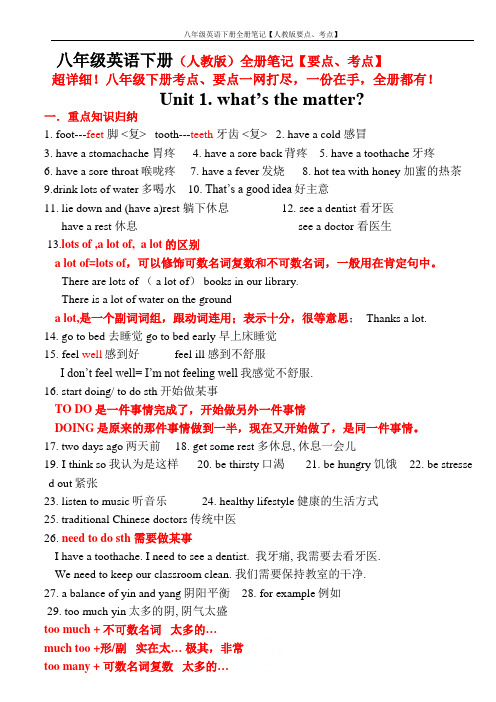
八年级英语下册(人教版)全册笔记【要点、考点】超详细!八年级下册考点、要点一网打尽,一份在手,全册都有!Unit 1. what’s the matter?一.重点知识归纳1. foot---feet脚 <复> tooth---teeth 牙齿 <复>2. have a cold 感冒3. have a stomachache 胃疼4. have a sore back背疼5. have a toothache牙疼6. have a sore throat喉咙疼7. have a fever发烧8. hot tea with honey 加蜜的热茶9.drink lots of water多喝水 10. That’s a good idea好主意11. lie down and (have a)rest 躺下休息 12. see a dentist 看牙医have a rest 休息 see a doctor 看医生13.lots of ,a lot of, a lot的区别a lot of=lots of,可以修饰可数名词复数和不可数名词,一般用在肯定句中。
There are lots of ( a lot of) books in our library.There is a lot of water on the grounda lot,是一个副词词组,跟动词连用;表示十分,很等意思; Thanks a lot.14. go to bed 去睡觉 go to bed early 早上床睡觉15. feel well感到好 feel ill 感到不舒服I don’t feel well= I’m not feeling well我感觉不舒服.16. start doing/ to do sth开始做某事TO DO 是一件事情完成了,开始做另外一件事情DOING是原来的那件事情做到一半,现在又开始做了,是同一件事情。
八年级下册英语笔记重点归纳

八年级下册英语笔记重点归纳一、Unit 1 What's the matter?1. 重点单词。
- matter n.问题;事情。
常用搭配:What's the matter (with sb.)?(某人)怎么了?- have a cold 感冒。
类似的表达还有:have a fever(发烧),have a cough (咳嗽)等。
- stomachache n.胃痛;腹痛。
“-ache”为后缀,表示疼痛,如:headache (头痛),toothache(牙痛)。
- foot n.脚,复数形式为feet。
- lie v.躺;平躺。
lie - lay - lain。
例如:You should lie down and rest.(你应该躺下休息。
)- rest v. n.放松;休息。
如:take a rest(休息一下)。
2. 重点短语。
- take one's temperature 量体温。
例如:The nurse took my temperature.(护士给我量了体温。
)- take breaks (take a break) 休息。
We should take breaks when we are tired.(当我们累的时候应该休息。
)- get off 下车。
He got off the bus at the next stop.(他在下一站下了公共汽车。
)- to one's surprise 使……惊讶的是;出乎……的意料。
To my surprise, he passed the exam.(令我惊讶的是,他通过了考试。
)- What should I do? 我应该做什么?用于询问建议。
- You should see a dentist and get an X - ray. 你应该去看牙医并且拍个X 光片。
should为情态动词,后接动词原形,表示建议。
人教版八年级下册英语必考知识点梳理(期末复习必备)

人教版八年级下册英语必考知识点梳理(期末复习必备)八年级下册英语知识点Unit 1 What’s the matter?【重点短语】1.have a fever 发烧2.have a cough 咳嗽3.have a toothache 牙疼4.talk too much 说得太多5.drink enough water 喝足够的水6.have a cold 受凉;感冒7.have a stomachache 胃疼8.have a sore back 背疼9.have a sore throat 喉咙痛10. take risks 冒险11.hot tea with honey 加蜂蜜的热茶12.see a dentist 看牙医13.get an X-ray 拍X 光片14.take one’s temperature 量体温15.put some medicine on sth. 在……上面敷药16. give up 放弃17. sound like 听起来像18. all weekend 整个周末19. in the same way 以同样的方式20. go to a doctor 看医生21. go along 沿着……走22. on the side of the road 在马路边23. shout for help 大声呼救24. without thinking twice 没有多想25. get off 下车26. have a heart problem 有心脏病27. to one’s surprise 另某人惊讶的是28. thanks to 多亏了;由于29. in time 及时30. make a decision 做出决定31. get into trouble 造成麻烦32. right away 立刻;马上33. because of 由于34. get out of 离开;从……出来35. keep on doing sth. 继续或坚持做某事36. put a bandage on sth. 用绷带包扎37. fall down 摔倒38. feel sick 感到恶心39. have a nosebleed 流鼻血40. cut his knee 割伤他的膝盖41. put her head back 把她的头向后仰42. have problems breathing 呼吸困难43. mountain climbing 登山运动44. be used to doing sth. 习惯做某事45. run out (of) 用完;用尽46. so that 以便47. so...that... 如此……以至于...…48. be in control of 掌管;管理49. in a difficult situation 在闲境中【重点句型】1. What's the matter with you?= What'the trouble with you? = What's wrong with you? 你怎么了?2. What should she do? 她该怎么办呢?3.Should I take my temperature? 我应该量一下体温吗?4.You should lie down and rest. 你应该躺下休息一会儿。
(完整版)八年级下册Unit8英语知识点
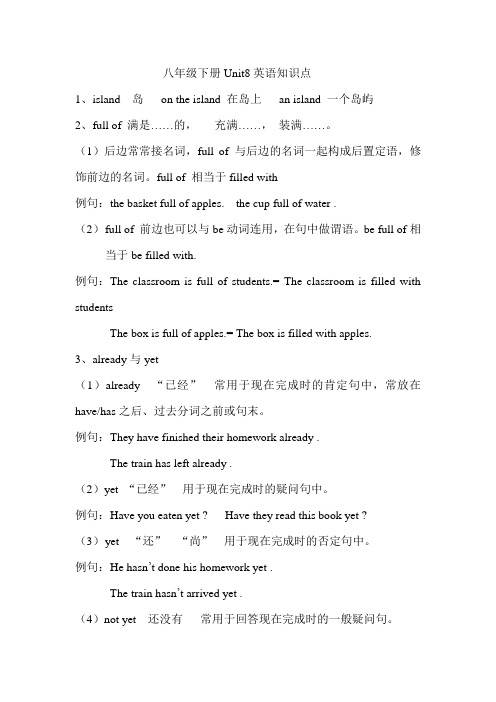
八年级下册Unit8英语知识点1、island 岛on the island 在岛上an island 一个岛屿2、full of 满是……的,充满……,装满……。
(1)后边常常接名词,full of 与后边的名词一起构成后置定语,修饰前边的名词。
full of 相当于filled with例句:the basket full of apples. the cup full of water .(2)f ull of 前边也可以与be动词连用,在句中做谓语。
be full of相当于be filled with.例句:The classroom is full of students.= The classroom is filled with studentsThe box is full of apples.= The box is filled with apples.3、already与yet(1)already “已经”常用于现在完成时的肯定句中,常放在have/has之后、过去分词之前或句末。
例句:They have finished their homework already .The train has left already .(2)yet “已经”用于现在完成时的疑问句中。
例句:Have you eaten yet ? Have they read this book yet ?(3)y et “还”“尚”用于现在完成时的否定句中。
例句:He hasn’t done his homework yet .The train hasn’t arrived yet .(4)not yet 还没有常用于回答现在完成时的一般疑问句。
例句:Have you eaten yet ? Not yet.4、英语中,疑问词what/how/which/where/who/when 后边出现动词时,往往用“疑问词+ to do sth ”结构,此结构在句中可以做主语、宾语和表语.例句:I can’t decide when to start . please tell me what to do next .He doesn’t know where to live . Do you know which to buy ?5、finish doing sth 做完某事例句:Did you finish watching TV ? I have finished cleaning the room .6、put down 放下down是副词,接代词时,代词要放在中间。
八年级英语下册知识总结归纳

八年级英语下册知识总结归纳知识才是力量,只有知识能使我们诚实地爱人,尊重人的劳动,由衷地赞赏无间断的伟大劳动的美好成果;只有知识才能使我们成为具有坚强精神的、诚实的、有理性的人。
下面小编给大家分享一些八年级英语下册知识总结归纳,希望能够帮助大家,欢迎阅读!八年级英语下册知识总结1I’ve had this bike for three years.【重点单词】yard [jɑ:d] n. 院子yard sale 庭院拍卖会sweet [swi:t] adj. & n. 甜的,糖果memory [?mem?r?] n. 记忆,记忆力,回忆cent [sent] n. 分,分币toy [t?i] n. 玩具bear [b??] n. 熊maker [?me?k?(r)] n. 生产者,制造者bread maker 面包机scarf [skɑ:f] n. 围巾,披巾,头巾soft [s?ft] adj. 柔软的soft toy 软体玩具,布绒玩具check [t?ek] n. & v. 餐馆账单;检查check out 察看,观察board [b?:d] n. 板子,甲板board game 棋类游戏junior [?d?u:n??(r)] adj. 地位低下的junior high school 初中clear [kl??] adj. 清晰的,清澈的clear out 清理,清除掉bedroom [?bedru:m] n. 卧室no longer 不再,不复own [?un] adj. 属于自己的railway [?re?lwe?] n. 铁路,铁道part [pɑ:t] n. 部分,零部件part with 放弃,交出certain [?s?:tn] adj. 某一,确定的,无疑的as for 至于,关于honest [??n?st] adj. 诚实的,正直的to be honest 说实在的while [wail] conj. & n. 当...时候,一段时间,一会儿truthful [?tru:θfl] adj. 诚实的,真实的hometown [?h??mta?n] n. 家乡,故乡nowadays [?na??de?z] adv. 现今,现在,目前search [s?:t?] v. 搜索,搜查among [??m??] prep. 在…中间;在…之中crayon ['kre??n] n. 彩色铅笔shame [?e?m] n. 羞耻regard [r?'ɡɑ:d] n. & v. 致敬,问候;将…视为count [kaunt] n. & v. 计算,计数;有价值century ['sent??r?] n. 世纪,百年according [?'k?:d??] adv. 依照,按照opposite [??p?zit] prep. & adj. 在…对面,与…相对;对面的especially [??spe??li] adv. 特别,尤其childhood [?t?a?ldh?d] n. 孩童时期consider [k?n?sid?] v. 仔细考虑,思考,注视,close to 几乎,接近hold [h?uld] v. 拥有,抓住【重点短语】1. these days 目前,现在2.regard with great interest 以极大的兴趣关注着3. in order to 为了4.so far 迄今,到目前为止5. in need 需要6. not...any more 不再.....7. welcome to sp 欢迎来到.....8.check out 察看,观察9. board games 棋类游戏10. one last thing 最后一样东西11. junior high school 初级中学12.clear out 清理13. no longer 不再14.toy monkey 玩具猴15. part with 与.....分开16. to be honest 说实在的17. ride a bike 骑自行车18. have a yard sale 进行庭院拍卖会19. one’s old things 某人的旧东西20. bring back sweet memories 勾起甜美的回忆21. give away 捐赠22. play for a while 玩一会23. do with 处理,处置24. search for work 找工作25.for the last 13 years 在过去的13年里26. the mid-20th century 20世纪中期27. stay the same 保持原状28. according to 依照,按照29. in one’s opinion 依......看30. in my time 在我那个年代【重点句型】1. Have long have you had that bike over there? 那边的那辆自行车你买了多久了?2. Amy has had her favorite book for three years . 艾米拥有她最喜欢的书3年了。
八年级英语下册知识点

八年级英语下册知识点Unit 1 what’s the matter?一、重点短语词组1. have a fever 发烧2. have a cough 咳嗽3. have a toothache 牙疼4. talk too much 说得太多5. drink enough water 喝足够的水6. have a cold 受凉;感冒7. have a stomachache 胃疼8. have a sore back 背疼9. have a sore throat 喉咙痛10. lie down and rest 躺下来休息11. hot tea with honey 加蜂蜜的热茶12. see a dentist 看牙医13. get an X-ray 拍X 光片14. take one’s temperature 量体温15. balanced diet平衡饮食16. go along…沿着……走17. take breaks 休息18. sound like 听起来像19. all weekend 整个周末20. in the same way 以同样的方式21. on the side of the road 在马路边22. shout for help 大声呼救23. without thinking twice 没有多想24. get off 下车get on 上车25. have a heart problem 有心脏病26. to one’s surprise 使.......惊讶的27. thanks to 多亏了;由于28. in time 及时29. save a life 挽救生命30. get into trouble 造成麻烦31. agree to do sth. 同意做什么32. because of 由于33. get out of 离开;从……出去34. hurt oneself 受伤35. put a bandage on sth.用绷带包扎36. fall down 摔倒37. feel sick 感到恶心38. have a nosebleed 流鼻血39. cut his knee 割伤他的膝盖40. put her head down 把她的头低下41. have problems breathing 呼吸困难42. mountain climbing 登山运动43. be used to doing sth. 习惯做某事44. take risks 冒险45. so that 为了46. So… that 如此……以至于…47. be in control of 掌管;管理48. in a difficult situation 在困境中49. keep on doing sth. 继续或坚持做某事 50. make a decision 做出决定51. stay healthy 保持健康=keep healthy=keep in good health=keep fit52. put some medicine on sth. 在…上面敷药二、重点句型1. What’s the matter?你怎么了?= What’s the trouble / problem with you?= What’s wrong with you?2. What should she do? 她该怎么办呢?Should I take my temperature? 我应该量一下体温吗?主语+ should/shouldn’t + 动词原形...①You should lie down and rest. 你应该躺下休息一会儿。
八年级下册英语知识点归纳总结

八年级下册英语知识点归纳总结一. 语法知识点1. 过去进行时过去进行时用于描述过去某个时间点或时间段正在进行的动作或情况,常与时间状语连用。
例如:- I was reading a book at this time yesterday.(昨天这个时间我正在看书。
)- They were playing basketball when it started raining.(下雨时他们正在打篮球。
)2. 一般将来时一般将来时用于表示将来某个时间点或时间段要发生的动作或情况。
例如:- I will visit my grandparents next weekend.(我下周末会去看望我的祖父母。
)- She is going to travel around the world after graduation.(毕业后她打算周游世界。
)3. 动词不定式动词不定式用于表示动作的目的、原因、结果或意图。
例如:- She needs to finish her homework before she can go out to play.(她需要先完成家庭作业才能出去玩。
)- I want to buy a new bike.(我想买一辆新自行车。
)4. 形容词比较级和最高级形容词比较级用于比较两者的大小、程度或数量;最高级用于比较三者或三者以上的大小、程度或数量。
例如:- The weather is getting colder and colder.(天气变得越来越冷了。
)- He is the tallest boy in our class.(他是我们班最高的男孩。
)5. 定语从句定语从句用于修饰名词或代词,用来说明或限定名词或代词的情况。
例如:- The girl who is wearing a red dress is my sister.(穿红色连衣裙的女孩是我的妹妹。
)- I know the man whose car was stolen.(我认识那辆车被偷的人。
八年级下册英语知识点总结

八年级下册英语知识点总结英语是一门广泛使用的语言,在全球范围内都有重要的地位。
作为一名八年级学生,学习英语是非常关键的。
下面将为大家总结八年级下册英语的重点知识点。
一、语法知识1. 直接引语和间接引语:直接引语是直接引用他人的原话,需使用引号标记;间接引语是将他人原话进行转述。
2. 时态:掌握一般现在时、一般过去时、一般将来时、现在进行时、过去进行时、现在完成时的基本用法和区别。
3. 被动语态:了解如何使用被动语态,即将主动语态句子中的主语变为动作的承受者,动词通过be动词词组和过去分词构成。
4. 宾语从句:了解宾语从句的构建规则,即将一个完整的句子作为宾语嵌入到主句中。
5. 并列连词:掌握如and、but、or等并列连词的使用,能够使用它们连接句子和短语。
二、词汇知识1. 同义词和反义词:学会辨别和使用同义词和反义词,能够丰富写作和口语中的表达。
2. 前缀和后缀:了解常见的前缀和后缀,可以通过改变单词的结构和含义,扩展词汇量。
3. 习惯用语和短语:学会使用一些习惯用语和短语,能够让你的英语更加地道和流利。
4. 近义词和辨析:掌握一些近义词和辨析词,能够在写作和阅读中正确使用它们。
三、句子结构和写作技巧1. 各种从句:了解各种从句的构建规则,如定语从句、主语从句、表语从句和状语从句,能够在写作中使用。
2. 书信写作:学会书写不同类型的书信,包括邀请信、道歉信、建议信等,了解书信的格式和常用句式。
3. 描述和说明:学会使用一些常用的描述性和说明性的句式,可以更清晰地表达自己的观点和观察。
四、阅读理解技巧1. 主旨大意题:通过阅读文段,掌握提取主旨和大意的技巧,能够准确回答相关问题。
2. 细节理解题:学会寻找文段中的细节,能够迅速找到相关信息并回答问题。
3. 推理判断题:理解文段的背景和内容,能够根据已有信息进行推理和判断。
4. 根据上下文猜测词义:通过上下文的提示和线索,能够猜测单词或短语的意义。
八下英语m2u1课文知识点

八下英语m2u1课文知识点
以下是八下英语m2u1课文的知识点总结:
1. 重点词汇:包括但不限于“创造”、“艺术家”、“画”、“音乐家”、“写音乐”等。
2. 重点词组:例如“be like”、“in the future”、“be able to”等。
3. 语法知识点:例如现在进行时、一般将来时、情态动词、条件状语从句等。
4. 写作技巧:学生应学习如何规划文章结构,撰写主题句,以及如何拓展段落内容等。
5. 文化背景知识:学生可以了解到不同国家的艺术文化背景,例如不同国家的传统艺术和现代艺术等。
以上仅为基础知识点总结,具体内容可能因教材版本、教师教学方法等因素而有所不同,建议查阅教辅练习资料或咨询英语教师,获取更准确的信息。
八年级下册英语重要知识点归纳
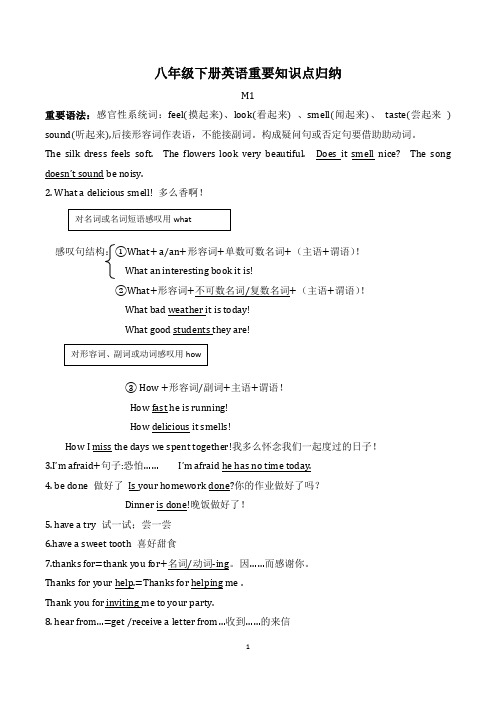
八年级下册英语重要知识点归纳M1重要语法:感官性系统词:feel(摸起来)、look(看起来) 、smell(闻起来)、 taste(尝起来 ) sound(听起来),后接形容词作表语,不能接副词。
构成疑问句或否定句要借助助动词。
The silk dress feels soft. The flowers look very beautiful. Does it smell nice? The song doesn’t sound be noisy.2. What a delicious smell! 多么香啊!感叹句结构:①What+ a/an+形容词+单数可数名词+(主语+谓语)!What an interesting book it is!②What+形容词+不可数名词/复数名词+(主语+谓语)!What bad weather it is today!What good students they are!③ How +形容词/副词+主语+谓语!How fast he is running!How delicious it smells!How I miss the days we spent together!我多么怀念我们一起度过的日子!3.I’m afraid+句子:恐怕…… I’m afraid he has no time today.4. be done 做好了 Is your homework done?你的作业做好了吗?Dinner is done!晚饭做好了!5. have a try 试一试;尝一尝6.have a sweet tooth 喜好甜食7.thanks for=thank you for+名词/动词-ing 。
因……而感谢你。
Thanks for your help.=Thanks for helping me .Thank you for inviting me to your party.8. hear from…=get /receive a letter from…收到……的来信9.can’t wait to do sth.迫不及待去做某事I can’t wait to see you.10.人+ spend+时间(in)doing sth.。
- 1、下载文档前请自行甄别文档内容的完整性,平台不提供额外的编辑、内容补充、找答案等附加服务。
- 2、"仅部分预览"的文档,不可在线预览部分如存在完整性等问题,可反馈申请退款(可完整预览的文档不适用该条件!)。
- 3、如文档侵犯您的权益,请联系客服反馈,我们会尽快为您处理(人工客服工作时间:9:00-18:30)。
八年级下册英语重要知识点归纳M1重要语法:感官性系统词:feel(摸起来)、look(看起来) 、smell(闻起来)、taste(尝起来 ) sound(听起来),后接形容词作表语,不能接副词。
构成疑问句或否定句要借助助动词。
The silk dress feels soft. The flowers look very beautiful. Does it smell nice The song doesn’t sound be noisy.感叹句结构:①What+ a/an+形容词+单数可数名词+(主语+谓语)!What an interesting book it is!②What+形容词+不可数名词/复数名词+(主语+谓语)!What bad weather it is today!③ How +形容词/副词+主语+谓语!How fast he is running!How delicious it smells!How I miss the days we spent together!我多么怀念我们一起度过的日子!’m afraid+句子:恐怕…… I’m afraid he has no time today.4. be done 做好了 Is your homework done你的作业做好了吗Dinner is done!晚饭做好了!5. have a try 试一试;尝一尝a sweet tooth 喜好甜食for=thank you for+名词/动词-ing。
因……而感谢你。
Thanks for your help.=Thanks for helping me .Thank you for inviting me to your party.8. hear from…=get /receive a letter from…收到……的来信’t wait to do sth.迫不及待去做某事I can’t wait to see you.10.人+ spend+时间(in)doing sth.。
=It takes +人+时间+to do sth. 某人花费多少时间做某事He spent two days (in) reading the novel.=It took him two days to read the novel.也(置于句末,前加逗号) also也(置于居中be或情态动词之后)as well也(置于句末,前不加逗号)proud of…以……为豪 My parents are proud of me.13. How do you feel about+名词/动词-ing=What do you think of+名词/动词-ing你觉得……怎么样How do you feel about the film=What do you think of the filmHow do you feel about coming to China=What do you think of coming to China 14. be afraid of+名词/动词-ing:害怕…. I am afaid of dog/going out atnight.be afraid of doing sth.=be afraid to do sth. 害怕做某事She is afraid of sleeping alone at night.= She is afraid to sleep aloneat night.15. What does sb. look like某人长得怎么样(问外表)答:short/tall/young/pretty…What is sb like某人性格怎么样(问性格或品质)答:quiet/nice/strict/kind..-What does your English teacher look like -He is tall with pair of glasses.-What is your English teacher like -He is strict but friendly.M2重要语法:现在完成时(一):描述过去已经、曾经或还没有做过某事的经历或体验,对现在造成的影响。
结构:have/has +动词过去分词——(否定) haven’t/hasn’t +动词过去分词含义:已经/曾经做过… 还没有做过…标志词:already、ever、never、yet、just等。
I have seen the movie.我已经看过这部电影。
(我现在了解该电影了。
)He has already finished his homework.他已经完成了作业。
(他可以交作业了)We haven’t had dinner yet. 我们还没有吃晚饭。
(我们现在饿)Have you ever entered a speaking competition你曾经参加过演讲比赛吗(变一般疑问句把have/has 提到句首)Yes, I have./No, I haven’t.a competition=take part in a competition参加竞赛sb.(to) do sth.帮助某人做某事 He often helps me learn English.4. afford sth.买得起某物I can’t afford the new bike.afford to do sth. 付得起钱去做某事 =have enough money to buy sth. She can’t afford to go to school.她没钱去上学。
5. stop to do sth.=stop and then do sth.停下来去做某事stop doing sth.停止做某事I’m tired. Let’s stop to have a rest.我累了。
让我们停下来休息一下吧!It’s time for class now. Let’s stop talking.上课时间到了!让我们不要讲话了!6. make up编写 make up a story编故事 make it/them up (代词要放中间)sb. to do sth.邀请某人做某事8. fifteen-year-old十五岁的(复合形容词中的名词不能加s ,作定语)fifteen years old 十五岁(短语,不能作定语,常作表语)He is fifteen years old.=He is a fifteen-year-old boy.the moment =now此刻(常用于现在进行时中)10. have/has been to+某地:曾经去过某地(人已经回来,常与次数连用)have/has gone to +某地:到某地去了(人未回,不能与次数连用)have/has been in +某地:在某地呆/逗留(常与for +时间段连用)I have been to Hong Kong twice.He isn’t here now. He has gone to the USA.We have been in China for 20 years.11. be different from…与…..不同it +形容词+ to do sth. 发现做某事是….的(it 是形式宾语,无义,替代后面不定式)I find it easy to learn maths. 我发现学数学很容易。
Tony finds it hard to speak Chinese. 托尼发现说汉语很难。
13. so far到目前为止(常用于现在完成时)So far I have learnt 3,000 English words.14. all over the world=around the world 全世界down 倒数M31. already已经(常用于现在完成时肯定句句中或句末)I have already knownhimyet尚,还(常用于现在完成时否定句或疑问句句末)Has it arrived yet just 刚刚(常用于现在完成时肯定句句中)They have just arrived.2. What are your up to=What are you doing你在忙什么’m not sure how to make it.= I’m not sure how I can make it.4. That’s why ….那就是……的原因了。
5. in order to+动词原形:为了… He works so hard in order to get the best score.so that+句子=in order that+句子:为了…He works so hard so that (in order that) he can get the best score.6. there is——(现在完成时形式)there has been 已经有/存在there are——(现在完成时形式)there have been已经有/存在There have been many buildings in our village since 15 years ago.around围绕……转8. none of +名词复数/宾格+动词(单/复形):……没有一个(既指人也指物) no one +动词(单)=nobody(仅指人,不与of 连用,常用于who提出的问题)None of the students know(s) the anwer. 没有一个学生知道答案。
-How many people are there in the room –None.一个也没有(强调数量)No one knows the answer. –Who’s in the classroom- No one.没有人(强调有没有人)9. be called…被称为……small part of… …….的一小部分with…与……联系 doing sth.完成做某事back回信M4重要语法:1.现在完成时(二):描述一个动作或状态从过去持续到现在乃至将来有多长时间。
常与“for+时间段/since+时间点”、so far、recently(最近)、in the last 10 years(最近十年)等表示持续的时间连用,也用于how long问句中。
